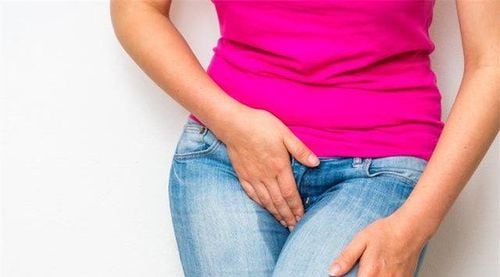This is an automatically translated article.
The article is professionally consulted by Master, Doctor Vo Thien Ngon - Department of General Surgery - Vinmec Da Nang International General Hospital
Urinary incontinence causes many problems for patients. The disease usually occurs in women, especially postpartum women. So what is urinary incontinence and why do women after giving birth often have urinary incontinence?
1. What is urinary incontinence?
Urinary incontinence is the involuntary leakage of urine. This disease is medically known as urinary incontinence. Urinary incontinence is not a disease of old age, it can happen to the elderly but absolutely not caused by age. Urinary incontinence after delivery is neither a sign of an actual illness.Currently, around the world there are about 50 million people with this disease and 1 in 10 women between the ages of 20 and 55 years old have it. Among people with urinary incontinence, about 20-50% of people have severe urinary incontinence.
Urinary incontinence causes unpleasant annoyances and makes patients always feel self-conscious and ashamed. Not only that, urinary incontinence also makes the patient feel unhygienic and causes an unpleasant odor on the body. However, urinary incontinence is completely treatable.
Trắc nghiệm: Những điều cần biết về kiêng cữ sau sinh
Sau sinh, cơ thể sản phụ sẽ có rất nhiều sự thay đổi, việc thực hiện tốt các kiêng cữ sau sinh và bổ sung đầy đủ các chất dinh dưỡng cho cơ thể sẽ giúp ích rất nhiều trong quá trình hồi phục sức khỏe. Bài trắc nghiệm dưới đây sẽ giúp mọi người có cái nhìn tổng quan về kiêng cữ sau sinh và thực hiện sao cho phù hợp nhất.The following content is prepared under supervision of Thạc sĩ, Bác sĩ y khoa, Tạ Quốc Bản , Sản phụ khoa , Khoa Sản phụ khoa - Bệnh viện Đa khoa Quốc tế Vinmec Phú Quốc
2. Why do women have urinary incontinence after giving birth?
The causes leading to urinary incontinence in women after childbirth are directly related to childbirth and menopause. The main causes are due to multiple births, large and heavy births. People who have had a tear in their mouth during childbirth or have had a hysterectomy and previous caesarean section may also experience urinary incontinence.Besides these causes, there are other causes of urinary incontinence that are not due to childbirth or menopause. These are causes such as obesity, high blood pressure, UTIs or diabetes. Not only that, prolonged constipation or coughing can also cause urinary incontinence. The causes of irregular lifestyle such as drinking too much water, coffee or alcohol, smoking also easily lead to urinary incontinence. In addition, pelvic radiation or trauma to the spine can also cause urinary incontinence.

3. Symptoms of urinary incontinence
Urinary incontinence can occur with any impact on the bladder, no matter how small. The patient may leak urine when laughing, coughing or pushing, sneezing. When running, jumping or carrying heavy objects can also leak urine. Some people even have urinary incontinence during intercourse, because every impact on the bladder can cause urinary incontinence for the patient.In addition to the symptoms of urinary incontinence, the patient may also have abnormal urination. Patients with frequent urination many times a day, nocturia and bedwetting are also a manifestation of the disease. Sometimes the urine comes out on its own and causes the pants to be wet all day. Sometimes the patient has difficulty urinating and has to push, sometimes the urge to urinate is just finished but there is no drop. The patient's feeling of needing to urinate is not clear.
4. Urinary incontinence at the end of pregnancy
Pregnant women in the last months can also experience urinary incontinence. The reason is that the pregnant belly will sometimes put a little pressure on the urinary tract and can cause a few drops of urine to flow out of control. This phenomenon can occur more and more severe in the days leading up to birth.This is a fairly normal phenomenon during pregnancy, but you also need to distinguish between urine leakage and amniotic fluid during pregnancy. Leaky amniotic fluid is a phenomenon in which amniotic fluid leaks out during pregnancy when a woman stands up or when she changes position from lying down to sitting. Amniotic fluid is usually clear and does not smell like urine.
5. How to treat urinary incontinence?

Besides, you also need to change your lifestyle from drinking enough water, not drinking too much water or coffee, alcohol. Don't let constipation persist and start a weight loss and healthy eating regimen. The most important thing is to practice holding urine and practice urinating by the hour. You can also do exercises to strengthen the muscles in the intimate area, these exercises can strengthen the muscles and limit urinary incontinence.
If the urinary incontinence is severe, the patient may have to perform surgery, laparoscopy or vaginal delivery. Intermittent urinary catheterization is also a measure to help treat urinary incontinence.
Please dial HOTLINE for more information or register for an appointment HERE. Download MyVinmec app to make appointments faster and to manage your bookings easily.















